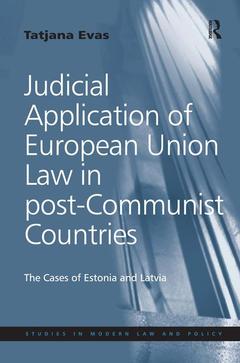Description
Judicial Application of European Union Law in post-Communist Countries
The Cases of Estonia and Latvia
Author: Evas Tatjana
Language: English
Subjects for Judicial Application of European Union Law in...:
Keywords
EU Legal; EU Competition Law; EU Secondary Legislation; EU Legal Order; Estonian Supreme Court; courts; EU Legal System; Enforce EU Law; Latvian Constitutional Court; ECJ Jurisprudence; ECJ Case Law; EU Competition Rule; EU Mandate; EU Law; National Ordinary Courts; EU Law Principle; EU Law Provision; Cee Country; Estonian Judicial System; Latvian Courts; Preliminary Reference Procedure; Vat Directive; Cee Member State; Cee Region; Input Vat; EU Charter
Approximative price 177.01 €
In Print (Delivery period: 14 days).
Add to cartPublication date: 11-2012
Support: Print on demand
Publication date: 11-2016
· 15.6x23.4 cm · Paperback
Description
/li>Contents
/li>Biography
/li>
These books may interest you

Ne Bis in Idem in EU Law 32.87 €

Ne Bis in Idem in EU Law 112.79 €

EU Constitutional Law 201.51 €

